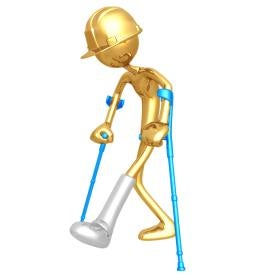The following provides an overview and assessment of the recent appellate court decision in Chlada v. Illinois Workers’ Compensation Comm’n, 2016 IL App (1st) 150122WC, issued July 8, 2016. The decision warrants discussion because on its face, it creates the impression that a claimant in a similar circumstance is entitled to more benefits than were actually awarded.
Case Fact Summary
The claimant sustained a compensable injury to his low back on July 15, 1999. As a result, he could not return to his pre-accident employment as a beer truck delivery driver for the employer, Burke Beverage. He did return to work for the employer after the accident, however, in its warehouse earning less than pre-accident wages. He was ultimately awarded weekly 8(d)1 wage differential benefits for life, calculated based on two thirds of what he would have been earning as a beer delivery truck driver less his post-accident earnings as a warehouseman.
While working as a warehouseman, the claimant sustained a compensable injury to his cervical spine in October of 2002. On January 13, 2003, the treating physician completely restricted him from work and he never returned. At the conclusion of medical treatment, including surgery, the treater released the claimant to return to work with permanent restrictions the employer did not accommodate. The claimant then contacted 1000 companies for job opportunities, but never secured any employment. The claimant was found to be permanently and totally disabled as a result of the cervical spine injury. (That claim was not part of the appeal in the instant case.) Permanent total disability benefits were awarded for life based on the claimant’s wage as a warehouseman.
Court Ruling and Analysis
This is a case of first impression as to the interplay between wage differential benefits and PTD benefits. According to the court, the question is:
Whether a claimant may be entitled to collect both types of benefits simultaneously when his earning capacity is diminished by a work-related injury and he subsequently suffers a second work-related accident that renders him totally unable to work.
The appellate court answered this question in the affirmative and upheld the claimant’s wage differential award and reversed the Commission’s determination that the wage differential award terminated when the claimant was no longer able to work due to the second injury. Moreover, the court found that the claimant was, at the same time, entitled to PTD benefits for his subsequent injury.
The case presented the following underlying question: (1) Did the claimant’s entitlement to a wage differential end as of January 13, 2003, which was the time the Commission determined the claimant’s PTD benefits commenced? The court concluded it did not, finding that a wage differential benefit does not terminate unless the claimant’s disability ceased or lessened. The subsequent disabling injury did not end the prior disability.
The disability (i.e., the reduced earning capacity) the claimant suffered as a result of the July 1999 back injury did not end merely because he suffered a second, more disabling work injury. The claimant's entitlement to wage differential benefits would end if and only if he later became able to earn the salary he formerly earned as a delivery truck driver. That never happened in this case.
Chlada, 2016 IL App (1st) 150122WC, ¶ 35.
The court further explained:
Here, the claimant suffered a diminished earning capacity due to the July 1999 work accident, which rendered him unable to work as a delivery truck driver and forced him to work in the employer's warehouse at a lower salary. The fact that the claimant subsequently suffered an unrelated and even more disabling work injury to his neck did not alter the fact that his July 1999 back injury reduced his earning capacity. Once the claimant established an entitlement to wage differential benefits as a result of his July 1999 back injury, he was entitled to collect such benefits "for the duration of his disability.”
To explain how the claimant could continue to receive a wage differential benefit while simultaneously receiving a PTD benefit, the court noted that the claimant suffered two economic disabilities:
The first economic disability is compensated by paying the claimant a wage differential benefit equal to 2/3 of the difference between what he was able to earn as a beer truck driver at the time of arbitration and what he was actually earning as a warehouseman at the time of arbitration (subject to the statutory cap in existence at the time, which was $485.65 per week).
Id. ¶ 38.
The court also said:
The second economic disability is compensated by paying the claimant PTD benefits in the amount of 2/3 of the salary he was earning as a warehouseman at the time of the second injury subject to the statutory cap, which amounts to $446.40 per week. Id.
Thus, the court concluded, “in order to be fully compensated under the Act for both of these work-related economic injuries, the claimant should receive both wage differential benefits of $485.65 per week indefinitely, and PTD benefits of $446.40 per week indefinitely.” Id.
To better understand the appellate court’s ruling, consider the case in this manner:
-
The first injury resulted in the claimant’s inability to return to his former employment and necessitated him accepting restricted work for less pay.
-
As a result of his new employment, which paid a lower wage, he was entitled to a wage differential.
-
Thus, as a result of his first work accident, to make him whole under the Act he received his new wage plus his wage differential rate.
-
The second injury occurred in the course of his employment for the same employer in his restricted employment at his new wage.
-
The PTD benefit replaces that lost wage.
-
Together, the wage differential and the PTD benefit place the employee back at his original AWW, subject to the applicable max rates.
Hopefully this diagram provides an additional explanation:
The claimant receives the wage differential benefit to ensure he meets his first full wage as a beer truck driver and delivery person; and he receives the PTD benefit to protect his new wage at the restricted employment.
Implications
There are a number of interesting aspects of this case to consider:
(1) How will this scheme work if there are two employers or two carriers involved?
If there had been two employers or two carriers in this case, the original employer or carrier would continue to pay the wage differential award and the second employer or carrier would pay the adjusted PTD benefit award.
(2) Would the appellate court have reached a different conclusion had the wage differential award been made pursuant to the recent amendments, which ends a wage differential at the end of five years or age 67, whichever is later?
This is an unknown at this time. However, a strong argument can be made that the General Assembly’s amendment means the employee should no longer receive the wage differential; the PTD benefit would then be based on the wage from the second employment.
(3) What if the low back condition improved and the claimant could be shown to not be disabled or not disabled as severely, but yet he could not work because of the second injury?
Here, a strong argument could be made that the wage differential benefit should be decreased. However, a petition to decrease that benefit would be subject to the time constraints of section 19(h) and may not, in certain cases, be available.
(4) How will the petitioner’s bar likely present this case?
The problem for employers is the rather loose wording of the opinion, which on its face implies that the claimant can receive both a section 8(d)(1) wage differential award and a section 8(f) PTD award. On closer examination, however, the decision limits the PTD award to the amount of the employee’s wage in his or her new employment, not the wage in the original employment. Thus, the decision does not award a full wage differential and a full PTD benefit based on the original AWW. Indeed, no employer should consider paying a PTD award on any amount above the wage earned in the second job.




 i
i



